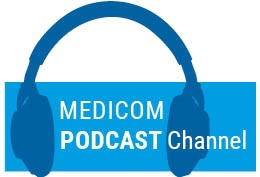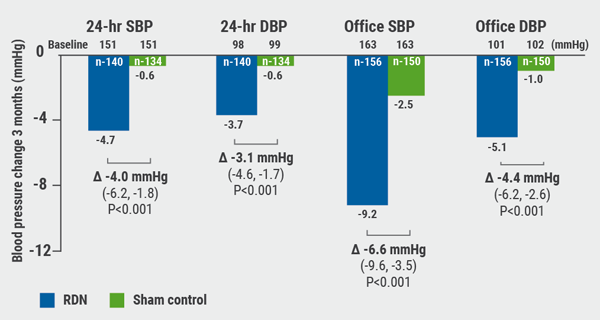Dr Frederick Raal (University of the Witwatersrand, South Africa), who presented the results of this study, explained that evinacumab is a fully human monoclonal antibody inhibitor of ANGPTL3 and reduces LDL-C regardless of the LDL receptor [1]. Patients were eligible if they were 12 years or older and on a stable maximally tolerated lipid-lowering therapy with LDL-C ≥70 mg/dL. Participants were randomised to evinacumab 15 mg/kg IV every 4 weeks (n=43) or placebo (n=22). The primary endpoint of the study was LDL reduction from baseline at 24 weeks.
At 24 weeks, the mean LDL reduction was 47.1% with evinacumab compared with an increase of 1.9% with placebo. This translates into an average relative reduction of 49% in patients receiving evinacumab, meeting the trial’s primary endpoint (P<0.001). For patients who received evinacumab, LDL reductions were similar for those with null/null alleles (n=15) and non-null/null mutations (n=28). At 24 weeks, the absolute change in LDL was 134.7 mg/dL for patients receiving evinacumab versus 2.6 mg/dL for those on placebo (difference of 132.1 mg/dL; P<0.0001).
Adverse events occurred in 65.9% of evinacumab patients versus 81% of placebo patients. Serious adverse events occurred in 4.5% of evinacumab patients while no placebo patients experienced serious adverse events. According to the researchers, events occurring in the evinacumab group were unrelated to the study drug. Several study limitations were pointed out, including the duration, particularly for conclusions regarding the long-term safety of evinacumab, which would presumably be taken life-long. The safety of evinacumab is being further assessed in the open-label treatment period of the trial.
- Raal FJ, et al. Abstract 411-12.ACC/WCC 28-30 March 2020.
Posted on
Previous Article
« ES-SCLC: tremelimumab + durvalumab + chemotherapy misses endpoint Next Article
Homozygous FH responds to alirocumab »
« ES-SCLC: tremelimumab + durvalumab + chemotherapy misses endpoint Next Article
Homozygous FH responds to alirocumab »
Table of Contents: ACC/WCC 2020
Featured articles
Heart Failure and Cardiomyopathies
Mavacamten shows promising results in non-obstructive hypertrophic cardiomyopathy
Vericiguat shows beneficial effects in a very high-risk HF population
No role for sodium nitrite in out-of-hospital cardiac arrest
Vascular Medicine and Thromboembolism
Rivaroxaban and aspirin effective and safe for PAD patients
TAILOR-PCI misses endpoint but still provides valuable insights
Edoxaban: alternative to warfarin after surgical aortic or mitral valve procedures?
Bleeding reduction post-TAVI with OAC alone vs OAC + clopidogrel
Apixaban offers new perspective for cancer patients in need of anticoagulation
Rivaroxaban superior to enoxaparin in preventing VTE in non-major orthopaedic surgery
Interventional Cardiology
TAVR safe and effective in low-risk bicuspid aortic stenosis patients
TAVR model reveals differences in hospital outcomes
2-year results show non-significant outcomes TAVR vs surgery in severe aortic stenosis
Renal denervation better than sham for blood pressure
Infusion of ethanol in the vein of Marshall for persistent AF
Atrial Fibrillation/Acute Coronary Syndrome
Fewer adverse events with ticagrelor monotherapy after 3 months DAPT
TWILIGHT sub-study: same outcomes for diabetes patients
TWILIGHT sub-study: complex PCI patients
LAAO Watchman registry data positive
Apixaban in AF patients with recent ACS/PCI: Drop aspirin after 30 days
Genetics and Prevention
Homozygous FH responds to alirocumab
Evinacumab significantly reduces LDL-C in homozygous FH patients
Higher serum levels of eicosapentaenoic acid correlate with reduced CV events
Quit smoking: vaping + counselling helps
Related Articles
September 8, 2020
TWILIGHT sub-study: same outcomes for diabetes patients

September 5, 2020
ACC.20/WCC Highlights Podcast Part 1 of 3

September 8, 2020
Renal denervation better than sham for blood pressure
© 2024 Medicom Medical Publishers. All rights reserved. Terms and Conditions | Privacy Policy
HEAD OFFICE
Laarderhoogtweg 25
1101 EB Amsterdam
The Netherlands
T: +31 85 4012 560
E: publishers@medicom-publishers.com

